Events & Media Report | 20 Nov 2024
Insights from the Global Mirror Group meeting
We recently gathered with stakeholders and organisations from outside of Europe to discuss how the ideal Partnership for Sustainable Food Systems (SFS) should look like. Read the main takeaways in this article.

FOODPathS Mirror Groups
The FOODPathS Mirror Group meetings serve as a bridge between the project consortium and external stakeholders, ensuring that all voices across the Farm2Fork spectrum are included and represented in the project’s work. This collaborative approach helps ensure that no one is left behind as we work to tackle the sustainability challenges facing food systems. To address these challenges, working in partnership is key – enabling us to find solutions that minimise trade-offs and maximise co-benefits.
The first Mirror Group meeting, at European level, took place in May 2024 (results available here). The second meeting, held in September 2024, brought together global experts and stakeholders to discuss the key components of an ideal Sustainable Food Systems (SFS) partnership and how such partnership would function.
Key outcomes from the Second (Global) Mirror Group meeting
With over 20 experts from around the world, the session followed a similar structure to the first. Participants were split into small groups to discuss key elements of an SFS partnership—such as funding cycles, public-private collaborations, educational networks, inclusive governance, and operational models. Here are some of the key takeaways:
1.Inclusive funding cycles for non-EU organisations
- Addressing the need to reduce administrative burdens and areas of greatest need, such as local and regional organisations outside Europe.
- Incorporating equity and human rights compliance into funding criteria to ensure fairness and inclusivity.
2. Public-private partnerships
- These partnerships should cover all sectors, actively support small enterprises and encourage cooperation between civil society and small and medium-sized enterprises (SMEs).
- Reducing inequalities between EU and non-EU organisations within these partnerships.
3. Transforming educational networks
- Leveraging the experience and best practices of existing institutions can be a valuable strategy for strengthening educational networks aimed at transforming food systems.
4. Promoting inclusive Governance
- Promoting closer collaboration among local actors was recommended to promote inclusive governance, reduce trade-offs and increase co-benefits.
- Shifting from traditional approaches to more informal, participatory practices could help prioritise meaningful impact over efficiency.
5. Technical support for non-EU stakeholders
- Non-EU countries need clearer guidance and stronger technical support to navigate complex processes effectively.
An ideal partnership should actively include small entities from diverse demographic backgrounds and foster inclusive communication that engages various audiences through innovative approaches like sharing success stories. Lastly, the partnership should create space for learning from failures and finding opportunities to overcome them.
What’s next?
The next Mirror Group meeting will bring together stakeholders and representatives from European and Global levels in November 2024. Stay tuned for the results!
Download the meeting notes to learn more about the main insights from the Global Miror Group meeting.

